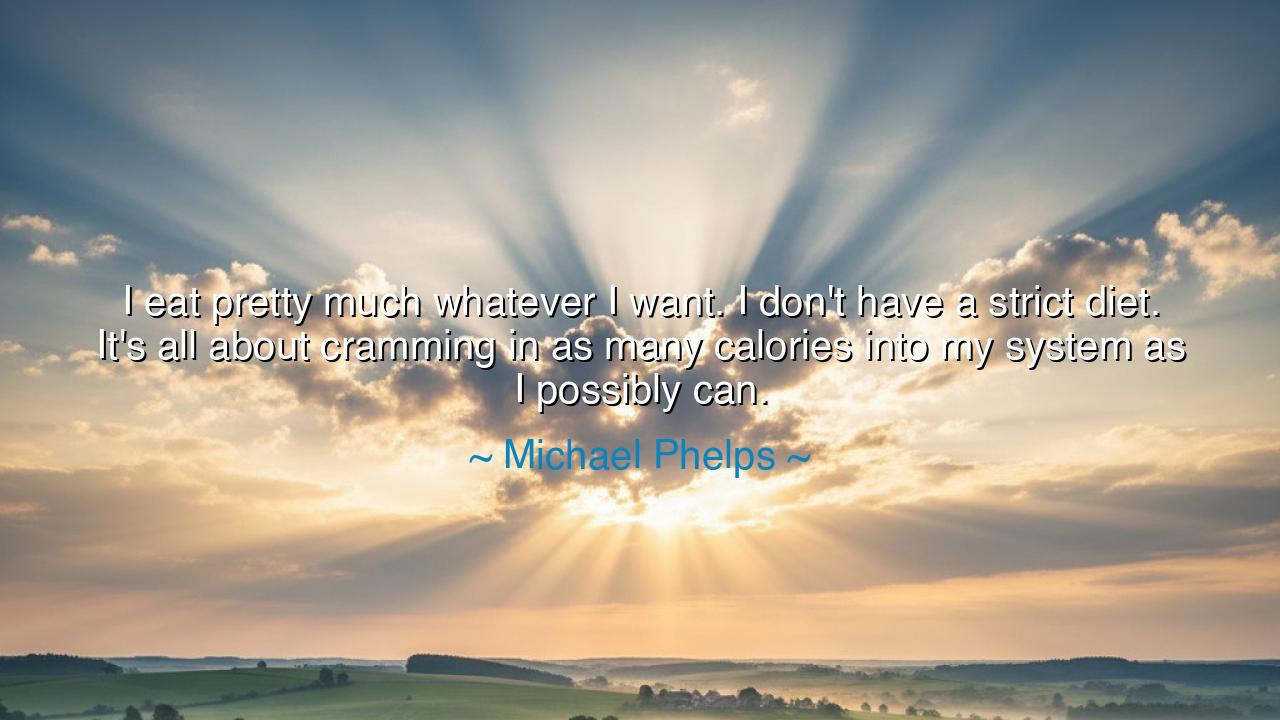
I eat pretty much whatever I want. I don't have a strict diet.
I eat pretty much whatever I want. I don't have a strict diet. It's all about cramming in as many calories into my system as I possibly can.






When Michael Phelps said, “I eat pretty much whatever I want. I don't have a strict diet. It's all about cramming in as many calories into my system as I possibly can,” he spoke not as one careless with his body, but as a man who understood deeply the relationship between fuel and purpose. These words, though simple, reveal the wisdom of alignment between need and discipline — of shaping one’s habits not according to vanity or rule, but according to function and destiny. For in truth, the measure of food, rest, or effort must always serve the greater calling that life has assigned to each of us.
In Phelps’s case, that calling was monumental. As one of the greatest Olympians in history, he lived not for indulgence, but for endurance — for hours in water that stripped the body of strength and warmth, demanding constant replenishment. His massive intake of calories was not gluttony, but sacrifice in the service of mastery. Each meal, heavy and relentless, became a ritual — the feeding of a body that would carry him through the fire of competition. Thus, his words teach us that what seems excessive to one may be essential to another. The ancients would have said: “Let your nourishment match your labor.”
In this sense, his quote reflects an ancient ideal. Among the Greek athletes of Olympia, diet was not ruled by fashion or deprivation but by purpose. The wrestler Milo of Croton, legend says, ate twenty pounds of meat and drank wine every day — not from greed, but from the demands of his training. To lift, to fight, to conquer required strength drawn from the earth’s bounty. Likewise, Phelps’s approach is a modern echo of this philosophy: to feed the body not for pleasure, but for power. He ate to build endurance, to fuel the spirit of relentless pursuit, to transform sustenance into strength.
But there is a subtler lesson here too — one that reaches beyond food and into life itself. Phelps reminds us that rules mean nothing without context. A “strict diet” might serve one person but weaken another. The wise do not follow dogma blindly; they study themselves, their purpose, and their path. To live well is to live in awareness of one’s own nature, to know what nourishes and what diminishes. The same principle guided the philosopher Hippocrates, who taught that health depends on balance, not uniformity — that each person’s needs are as unique as their destiny.
There is also humility in Phelps’s words, hidden behind their simplicity. He recognizes that the body is an instrument of the will, not an ornament for admiration. In an age where appearance is often worshipped above ability, his philosophy stands as a quiet act of rebellion. He eats not for image, but for purpose. His diet, like his training, is tailored to the demands of greatness. And in this, we see the ancient harmony between body and spirit — the idea that strength is not achieved through denial, but through understanding, balance, and devotion.
Consider also the story of Spartacus, the gladiator who led a rebellion not through luxury or ease, but through the strength of a body trained in hardship. He and his men survived not on feasts, but on simple, powerful food — grain, meat, and what they could gather. Yet their bodies became unbreakable, because their nourishment aligned with their purpose. This same principle beats in Phelps’s heart: that the right diet is not one of wealth or strictness, but one that feeds the mission one has chosen.
And so, the lesson is ancient and eternal: Eat according to your purpose, not according to your fear. Do not starve your strength in the name of image, nor indulge your appetite without meaning. Let your habits serve your highest work. If your path demands endurance, feed yourself with vigor. If it demands stillness, feed yourself with simplicity. For the body is not an enemy to be controlled, but a companion to be honored — the vessel through which the soul fulfills its destiny.
So, my listener, remember this teaching: discipline is not always restraint — sometimes it is alignment. To know thyself is the first rule of wisdom, and to feed thyself according to that knowledge is the second. Live as Michael Phelps did — with awareness, purpose, and harmony between need and action. In that balance lies not indulgence nor denial, but mastery — the quiet, powerful mastery of one who knows what he was made to do, and feeds the flame that drives him toward it.






AAdministratorAdministrator
Welcome, honored guests. Please leave a comment, we will respond soon